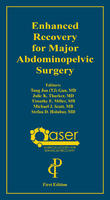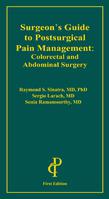Anesthesia/Surgery
Enhanced surgical recovery has moved to the forefront of concern for surgeons, physicians, and hospitals as more effective surgical pre-, peri-, and post-surgery protocols have been developed which improve patient care, minimize patient pain and discomfort, shorten hospital stays, and decrease utilization and related costs. An education need exists to provide authoritative, expert guidance in this area.
Enhanced Recovery for Major Abdominopelvic Surgery is a clinical manual providing detailed, expert guidance on the various components of the enhanced recovery program for major abdominopelvic surgery. Several chapters of the handbook are devoted to overcoming the challenges of implementing an enhanced recovery protocol within a practice or institution. Specific protocols for the most common abdominopelvic surgeries, including colorectal, liver, major gyn, distal pancreas and Whipple’s, and cystectomy are presented. Evidence supporting the protocol is included in each chapter as appropriate. The handbook is targeted to surgeons, anesthesiologists, nurses, and hospital administrators.
This handbook serves as a key educational resource for ASER to provide to those interested in establishing enhanced recovery protocols at their institutions. It is an official publication of the ASER. ASER is a nonprofit organization with an international membership dedicated to the practice of enhanced recovery in the perioperative patient through education and research. It is a multidiscipline and multispecialty society with representations from surgeons, anesthesiologists, nurses, nurse anesthetists, pharmacists, allied health care professionals, and patient advocates.
This handbook is designed to be highly clinically relevant and focuses on the various analgesic pharmacotherapy techniques and protocols available to minimize postoperative pain and pain medication side effects. Multimodal "opioid-sparing" analgesic techniques and stepwise protocols incorporating short- and long-acting local analgesia are reviewed in detail, along with strategies to minimize postoperative pain-related complications. Relevant pain pathophysiology is presented as a framework for understanding the basis of a multimodal approach to pain management. There are separate chapters for each class of pain medication. Pain management strategies in anorectal surgery, abdominal surgery, and special populations are presented in dedicated chapters.
Severe acute pain following trauma or same-day surgery is the most common reason for patient visits to the emergency department or for hospital readmission. Poorly controlled postoperative pain is among the most common of comlaints encountered by orthopedic caregivers and remains a major cause of patient dissatisfaction and delayed hospital discharge.
This handbook discusses the challenges in the management of orthopedic surgical pain and provides information on multimodal analgesia for patients recovering from orthopedic surgery. Anagesic options for total knee and hip arthroplasty, shoulder replacement, spine and back orthopedic surgery, ankle and foot surgery, and other procedures are discussed.


.jpg)